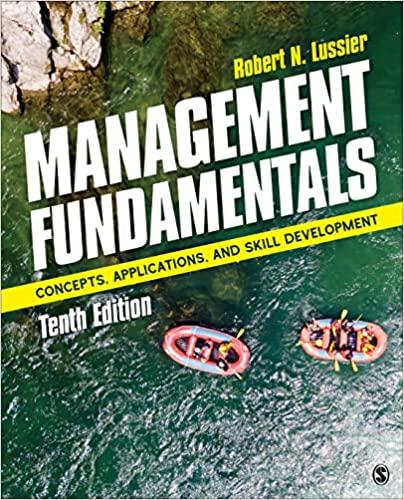Answered step by step
Verified Expert Solution
Question
1 Approved Answer
1: Today many employees are unwilling to relocate because of a variety of reasons, such as they like their current community, their spouse has a
1: Today many employees are unwilling to relocate because of a variety of reasons, such as they like their current community, their spouse has a career there and can't relocate, and spouses and children prefer not to move. Perhaps their spouse also has a career that they're not willing to give up. Yet employees need to develop new skills, strengthen skill weaknesses, and be exposed to new aspects of the business to prepare for management positions. Are there alternatives? Are there other ways an employee's current job can be changed to develop management skills? A: 100 words Q2: It's often cited as the reason there are so many bad supervisors out there. Basically the principle is that you get promoted to your level of incompetence. What it means is that a person who is very good at their job typically will get promoted. If they are good at that job, they get promoted again. This goes on until they are promoted to a position in which they are not very good at it. Some believe that the best supervisor to develop and promote is the person who is best at their job. This group believes that someone can't be a good supervisor unless they know their operations as well or better than their employees. If you hold this view and promote people based on it you're probably more likely to run into the Peter Principle. Another view is that a good supervisor is someone with good management and leadership skills and it matters less that they know their operations and what their employees are doing. There's probably not a right or wrong answer to this and it depends on the situation. Please share your thoughts and offer any examples you've experienced, one way or the other. (In another words share a "horrible boss" story) A: 100 words Q3: One of the problems with employee development today is that people don't spend their entire careers with on company anymore. There's less incentive for companies to invest a lot of time, money and resources to do that. Does that mean they should not do it anymore? Should companies be interested in helping employees plan their careers? What benefits can companies gain? What are the risks? A: 100 words Q4: Have you ever worked somewhere that you felt coached their employees? If so, did you think it changed the way you felt about working there? A: 50 WORDS Q5: Have you ever had an employer want to do personal and employee development within the workplace? Or did your past employers not seem to care if their employees were developing into better people and also better employees? A: 50 WORDS Q6: Would you prefer to develop as an employee on your own time through today's technology? Or through a company you are working for? A: 50 WORDS Q7: Regarding the article about Walgreens, do you think this was a smart move on their part? Do you think other companies have adopted this idea of coaching their employees as well? A; 50 WORDS Q8: If you were a manager, what challenges do you think you would face coaching employees, if any? A: 50 WORDS Q9: Have you ever wanted to leave a job because of the lack of development? If so, did you follow through with your desire to leave? A: 50 WORDS
Step by Step Solution
There are 3 Steps involved in it
Step: 1

Get Instant Access to Expert-Tailored Solutions
See step-by-step solutions with expert insights and AI powered tools for academic success
Step: 2

Step: 3

Ace Your Homework with AI
Get the answers you need in no time with our AI-driven, step-by-step assistance
Get Started


